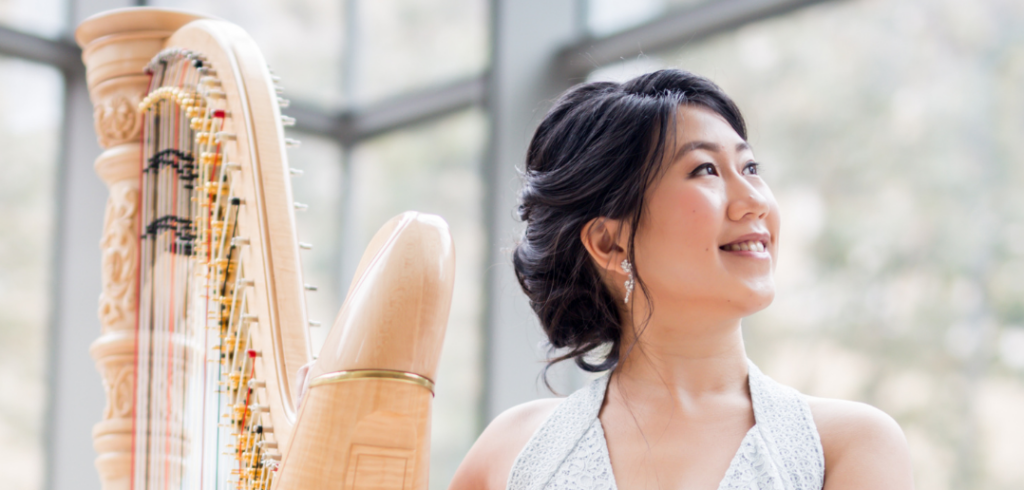Atlanta Symphony Orchestra principal harpist Elisabeth Remy Johnson has released her fourth album, Quest, on Albany Records. All 16 tracks were written by female composers. We reached out to Remy Johnson to learn more about her CD.
Quest is a celebration of underrepresented women composers. Why did you choose this project for your album?
I like to explain the need for gender equity in programming from a standpoint of logic. Unless we’re willing to posit that men are inherently better at composing music—and I’m not—then we’re missing half of the best music out there, most of the time. When the pandemic hit, I had already been working on some transcriptions of pieces by Clara Schumann, Mel Bonis, and Cécile Chaminade, and all of a sudden, I had far more time to devote to that. I started posting a monthly performance of a transcription or harp solo composed by a woman, and called it “The Even-ing Standard: A project to even out and open up the concept of standard repertoire.”
By summertime 2020, I started thinking more and more about recording an album, and then happened to connect with my dream producer, Elaine Martone, who was very supportive and excited about the project. Fortunately, she stayed excited as the project ballooned from 30 minutes to an hour over the next few months! I kept finding pieces I wanted to include, like Freya Waley-Cohen’s Skye, and I even added Fanny Mendelssohn a month before the recording sessions. I was playing through her Mélodie on her birthday, and I’d known for a long time that “Felix Mendelssohn had a talented sister.” However, when I played Mélodie for the first time, it’s so beautiful, I literally had tears in my eyes. It’s one thing to know an historical fact, and another to hear her voice, and I just had to include it.
The historical composers on this disc were also pianists, and some of them were truly exceptional performers. When you think about these women’s ability at the piano, and think about the societal conventions and restrictions they were confronted with, this was their voice. This was how they could truly speak without constraint, or deference, or propriety. I find it so thrilling to play the same music they played, and imagine how they might want to hear it as I adapt it to harp.
Your album includes a set of five pieces by French composer Mel Bonis. Tell us how you first discovered her compositions.
I am a huge Mel Bonis fan. When I first came across her name, I didn’t know anything about her, so I ordered her piano collection Femmes de légende and was utterly amazed by her beautiful writing. Then I read her biography, and was completely drawn in by her life story. When she was a girl, her family had a piano in the house just to be “proper” (this was mid-19th century Paris). They never imagined Mel would play it, let alone excel at it. She came to the attention of César Franck, who convinced her hesitant parents to permit her to attend the Paris Conservatory, where she was praised as one of its most brilliant pupils (even more amazing when you consider she was classmates with Claude Debussy). However, when she fell in love with another student, her parents were scandalized and removed her from the school. They found a husband they felt was appropriate—a kind, wealthy widower twice her age, who already had five sons. She dutifully married him, and they had three children together. Over time, Mel reconnected with her Conservatory circle, threw herself back into composition, and essentially lived two lives—one as Madame Domange, wife and mother, and one as Mel Bonis, brilliant composer.
After I finished her biography, I was so moved that I emailed the author, who happens to be her great-granddaughter. She was simply lovely in her response, and we have continued to correspond. In fact, she has just arranged for three of the Bonis transcriptions to be published by Éditions Billaudot in France. I’m also thrilled to be playing Mel Bonis’ trio Scènes de la forêt at the Grand Teton Music Festival this summer.
Tell us about the new works by living women composers that you included on the album. What were your highlights from working on these pieces and interacting with the composers?
Working with living composers is one of my absolute favorite things, whether it’s with the symphony, commissioning works for my chamber group, The Merian Ensemble, or in projects like this. I loved getting to know Niloufar Nourbakhsh. She’s an Iranian-American composer and pianist, and founding member and co-artistic director of the Iranian Female Composers Association. As I worked through the transcription of her piece, we would email back and forth, and I would send her recordings with the changes. It was a really fun, collaborative process.
The other solos are all originally for harp, and all of the composers were lovely to work with, extremely gracious and generous in giving interpretative feedback. I particularly enjoyed talking with Johanna Selleck about Spindrift. It’s amazing how she captured the different moods of the ocean. Even though she may have been imagining the ocean halfway around the world in Australia, her composition also captures the different moods of Cape Cod Bay absolutely perfectly. I love playing her piece.
Is there anything else you’d like to tell us about your new album?
There’s so much repertoire out there to discover, and it’s an exhilarating process I hope we can all incorporate into our pursuits. I’m putting together seven transcriptions in an anthology called “The Even-ing Standard,” which will be available later this year. I hope students, teachers, and performers will enjoy it, and will also look around for their own discoveries—whether it’s composers from the past, or the many fantastic women composing today. In terms of our repertoire being more representative of society as a whole, it’s imperative to include women, gender-expansive composers, and composers of color, and we can never take our foot off the pedal.
When you look at history, Mel Bonis was praised as one of the most brilliant pupils at the Paris Conservatory, but later in life, you can read her letters desperately scribbling for publishers to give her a fair deal. When Amy Beach performed in Europe in the early 20th century, a reviewer wrote: “As Robert Schumann prettily put, the names of true woman composers can be written on the leaf of a rose.” That shows a lot of things—pushing 75 years after Robert said that, that kind of statement was still thought “pretty,” and authoritative. Entrenched attitudes can take generations to change and can become cyclical. I’ll use an example from running, since I’m a big fan. When Shalane Flanagan won the NYC Marathon in 2017, there was a lot of talk about the “Shalane Effect”—she had been training with men a lot, was joined by more female teammates over the years, and instead of being threatened, she lifted them up, supported them, and they all did better. Well, you know what? Amy Beach was doing the same thing for women composers 100 years ago. She advocated for women composers and formed a league for their support and promotion. After making some progress, her projects were derailed by the Depression, and the cycle began again.
A group in the UK just did an extensive study of 100 major orchestras from 27 different countries. Even with some progress over the past few years, in the 2020-2021 season, women composers were still missing from 88.55% of programs. We miss too much creative spirit, too much artistic joy if we let that statistic stand.
Quest is available through Albany Records or Amazon, and digitally through iTunes, Amazon Music, and other streaming platforms. For more information, visit Remy Johnson’s website.













